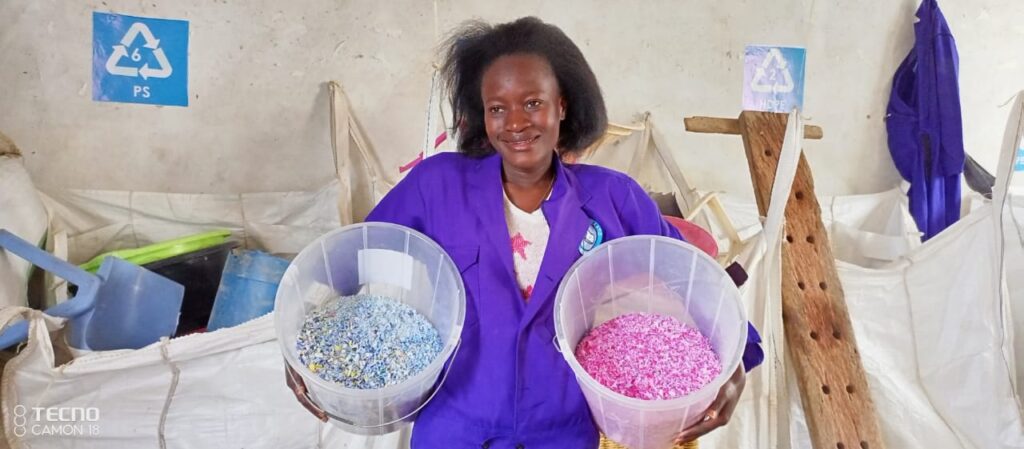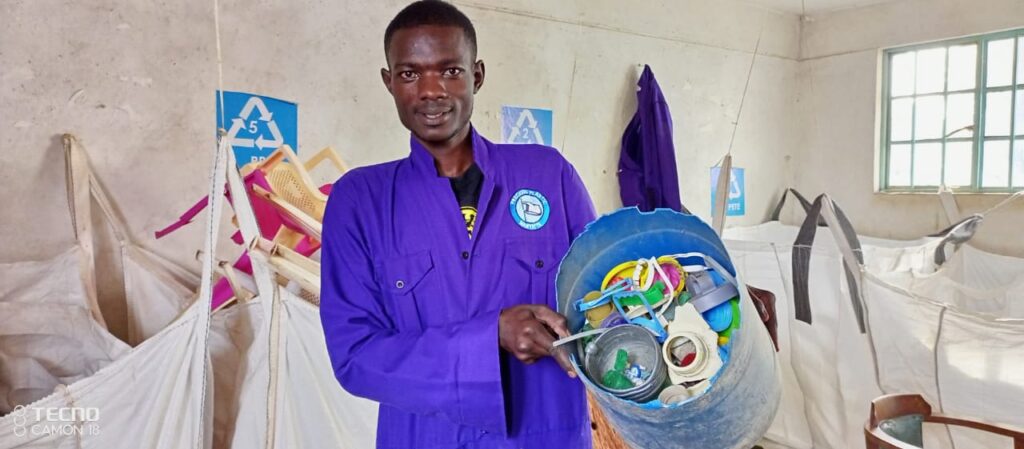Twenty-six-year-old Edwin Bongo is a first year Special Needs Education student.
When he is not in class, he is picking plastic bottles within his Manyatta Slum residence, in Kisumu, or at his Koyango Baptist Church processing the plastic waste into aesthetic products.
What many people treat as waste is a source of cash to him and his fellow youths in church, and he has come to the realization that their business of recycling the waste is a lifeline to the environment chocking with plastic waste.
When Lake Region Bulletin caught up with Bongo at his church compound, he was sorting out some plastic wastes collected a few days before.
According to Bongo who grew up in Manyatta, a year ago, church guests from abroad had visited the area.
“They were shocked at the loads of plastic wastes in our drainages, and they mobilized a few youths to have some cleaning exercise,” said Bongo.
He was among the youths in the program.

Guests from Heaven
The guests then proposed that they begin a recycling program to save the environment, and also fetch some pocket money for the youths.
“They got us some machines to use for melting and moulding the plastics, and trained us, and soon we begun,” he said.
He added: “We then registered Precious Plastic Manyatta as a Community Based Organization which is helping with the structuring and management of the work.”
Today, the group’s workshop within the church compound is a beehive of activities.
Debrah Anyango, 21, a healthcare student is also a member of this team.
According to Ms Anyango, the group conducts regular cleaning exercises in the estate, and the neighbouring areas, where they collect plastic material.
“We do general cleaning, but we only pick plastics. The rest of the waste which we do not use are taken to the relevant organizations using them, or to the central waste collection skips,” she said.
Anyango’s main task at the centre is to wash the plastics, dry them and sort them before pushing them to the next stage.
The sorting is done to ensure that different plastic colours and quality are in the same place for easy processing.
Some of the main machines they use include; injection, extrusion, pickle and shredder.
Injection is used melts plastics before moulding them into cloth pegs, door knobs, big five animals and the foetus (baby), while extrusion melts the plastics which are moulded into fruit balls, flower vase and soap dish.
“Sometimes the plastic loses some kilograms after shredding, so we make sure that we measure the weight before shredding and again after shredding,” said Anyango.
Apart from clean ups, the group also purchases the wastes from the local dumpsites, from school going children during school days and from street urchins.
Purchases from street urchins cost Sh25 per kilogram.

Plastic waste in Kisumu
According to data from Kisumu County Environment Department, the county collects 500 tonnes of waste generated every day.
Out of this, 10 per cent is plastic, and only 18 per cent of the plastic goes to the recycling market.
County Director of Environment Ken Koyoo says; “the recycling market in Kisumu is relatively informal, with few players. Others are aggregators who buy plastic waste and sell to the real recyclers.”
However, Koyoo mentioned the issue of separation of waste from the source as being one of the key challenges which make the plastic waste lose value.
Some of the key challenge Manyatta Precious Plastic faces include; designing some of the products they make, and marketing.
“There is this time a customer made an order for a flower vase with a strange conical shape and we did not have such a model, and our trials to innovate one through the metal artians in Kisumu did not bear fruits,” said Bongo.
The other challenge is that the local people are not their main clients, as many of them do not see the benefits of the products they make.
“Most of the clients we get are foreigners (tourists) rather than locals, and when they come we make sales. In a month, we make sales from as low as Sh5, 000 to as high as Sh300, 000,” said Bongo.
And with only six members of the team, Bongo says their future plan is to expand the venture into a big company to offer employment to the youths.
What motivates them is how their simple actions have transformed plastic waste management in the area, in a bid to help save the environment.
“Through this project, we have learnt a lot about plastic pollution and how it has major impacts in our environment, and out hope is that we get off all the plastics from our environment,” added Bongo.

Impressive work